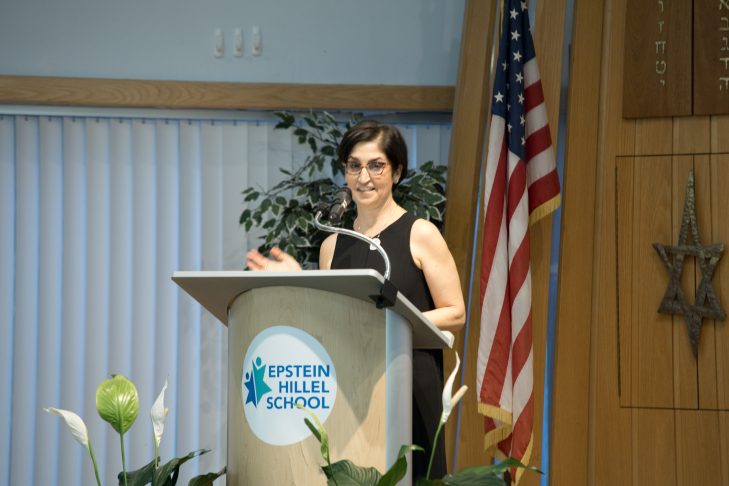This is my fourth year as head of school and it’s been my absolute honor and pleasure to lead this faculty and staff. What you might not know is that I did not study education as an undergraduate; instead, I majored in European history and French. I was always fascinated by examining the culture of people and places in time. I’ve been a people-watcher for most of my life and have had to learn to be discrete in places like restaurants, theaters and airports. Airports are my favorite because you can observe individuals out of their comfort zone in a place that is temporary. People are stressing, rushing and killing time. You see people of all ages, ethnicities, religions and socio-economic classes managing the organized chaos, anxiety and excitement of travel when things are completely out of their control.
Airports reveal a lot about people and the choices they make. It is a cultural anthropologist’s gold mine. Now, you may wonder, why on earth is Amy talking about airports and anthropology? I’ll tell you why; I want you to close your eyes and pretend you have never walked through the doors of EHS. I know some of you are parents, faculty, alumni, grandparents and community members who know our school well, so this sounds impossible, but bear with me and imagine this is your first time at EHS. You are trying to understand the school, its culture and values. What might you notice about people’s behavior? The history student in me posits that there are multiple pathways to truly understanding a school and its culture. You have to look for evidence that will answer five central questions.
The first question is that of a parent: Do I want my children to go to this school?
To answer, you must be a keen observer while walking through the halls. Here is a snapshot of what you will see as you begin your tour. Individual students will greet you in every classroom with a warm welcome, good eye contact, a self introduction and an explanation of what is happening during the lesson. You will notice how students hold the door for one another and cheer each other on in the gaga pit at recess. You might even hear what I did a few weeks ago. After experiencing a joyful and spirited Kabbalat Shabbat one Friday, a parent said to me, “I want to be a student at EHS!” I guess that answers our first question.
The second question comes from a student’s perspective: Do I want to go to school with these kids and have these teachers?
What evidence might you find? At Kabbalat Shabbat, you would observe younger children sitting on the laps of older children. In the library/learning commons, you would see second-graders making movies using green-screen technology. In a Hebrew class, you would see fifth-grade students having “cocktail parties” to practice their conversational Hebrew skills. Sounds like fun, right? Well, that is just what we heard when we hosted a student visit day during April vacation. One child who visited had such a great time, she came home and told her parents, “I want to go to school at Epstein Hillel. The kids and teachers are so nice.” What makes this story all the more special is that when her mom told her that she had signed her up for school during the April vacation, the child wasn’t too happy. In fact, we heard there were tears involved. And guess what? Now her dream is coming true. She will be joining our school next fall. Children want to be students at EHS.
The third central question comes from a teacher who says: Does this seem like a place I would I want to work?
Continuing on your journey through the building, you would enter the faculty/staff room and see a white board filled with notes in different colors to celebrate each other’s classroom successes. You would hear a lot of laughter and see many smiles as colleagues conversed. You would look at bulletin boards and see a balance between Hebrew and English as an expression of our values. Teaching at EHS is highly coveted and turnover is low. I do have one person retiring this year, and there are two finalists who were vying for her job. They both happen to share a mutual friend who currently works at our school. Each finalist told this mutual friend, “I really hope I get the job at EHS. I fell in love with the school when I visited, and really want to work there.” It doesn’t get more authentic than that. I guess we have our answer.
The fourth question addresses our alumni: Is this a place I want to stay connected to all these years later?
Head down to the conference room and you might see any number of former students who have dropped by EHS to take a picture in front of their tiles, find themselves on the graduating class wall and chat with their former teachers. On every doorpost in our school, you will see beautiful blue glass mezzuzot that were purchased by alumni as a way to symbolically bless the school when it was renamed in 2017. I could show you the email I got last week from an alum who just finished his freshman year at college. His note said the following, “I would really love the opportunity to be a tutor for Epstein Hillel and to give back to the school that helped to spark my passion for Judaism.” And the ultimate piece of evidence of wanting to stay connected? Sixteen percent of EHS’s current study body are second-generation students at 6 Community Road.
The very last question is one that can be answered by community members and stakeholders: Is this a place where I would want to volunteer my time and resources to ensure it continues?
You finish your tour back in our lobby, where you will meet one of our many volunteers who come and go each week at school. Ask them what they do and they will tell you about their experiences tutoring Hebrew, sorting and shelving books in the library, tutoring math and spending a year as a grand-friend in first grade. Some of these individuals never had a child or grandchild at this school, but they want to be a part of its mission and success. You will be able to read about our volunteers in this year’s annual report. These community members and stakeholders volunteer their time, talent and resources for our students because it not only puts a smile on the students’ faces, but on theirs as well.
Ralph Waldo Emerson said, “The purpose of life is not to be happy. It is to be useful, to be honorable, to be compassionate, to have it make some difference that you have lived and lived well.” I know that Epstein Hillel School is making a difference, and I want us to keep living for many, many years to come.
I hope you are inspired to be a part of our school and its history, whether your role is student, parent, faculty member, alum or community stakeholder. We all are making history together. I’d like to acknowledge all of EHS’s faculty, staff and administration for their dedication, talent and leadership. This school is as strong and vibrant as it is because of all of you!
This post has been contributed by a third party. The opinions, facts and any media content are presented solely by the author, and JewishBoston assumes no responsibility for them. Want to add your voice to the conversation? Publish your own post here. MORE



